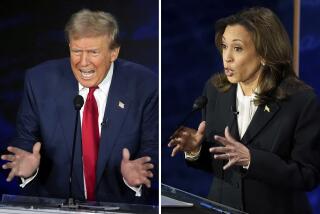Reporter’s Notebook: What it’s like to moderate a debate for the dozens of presidential candidates you’ve never heard of
Reporting from Manchester, N.H. — I’d never moderated a presidential debate. And it did not take long for me to recognize there was nothing I could have done to prepare for the first.
“A car was burned in my yard on my farm … and I’m not too happy about it,” Republican hopeful Stephen Comley declared in his opening statement Tuesday night.
Comley was the first of 23 candidates to speak at a quadrennial forum at St. Anselm College for so-called lesser-known presidential hopefuls, part of a decades-old ritual in the nation’s first primary state where even those candidates without national name recognition are granted a chance to make their case to voters.
Join the conversation on Facebook >>
For all the focus on the Donald and the Bern, on Hillary and Jeb, they are only a few of the 58 people whose names will appear on the New Hampshire primary ballot. The majority of them are like Comley, for whom the $1,000 candidacy filing fee was one of the biggest expenses of the campaign, along with the cost of coming to Manchester on a bitterly cold New Hampshire night for the debate, which gave them a chance to finally promote their platform before television cameras.
The biggest news out of the debate was that the candidate who wears a boot on his head and promises free ponies for everyone was banned. Four years ago, he stood up and glitter-bombed a fellow Democratic candidate who warned that homosexuality was a sin against nature. Vermin Supreme -- that is his legal name, now -- said God told him to make the candidate gay. The debate sponsors didn’t appreciate the cleaning bill and this year told him thanks but no thanks.
One candidate vowed to “bring the message of Christmas to as many people as possible.” And another said he was in the race “partly on the issue of dignity for white people.”
What would be your follow-up question?
The event has often been labeled a “fringe forum” and dismissed with jokes. And to be sure, some candidates file for ballot access not for a noble purpose but for self-promotion -- such as it is, with an audience in the dozens at St. Anselm College and perhaps only hundreds watching on C-Span.
But most of the candidates who attended Tuesday were earnest participants with a desire to share their ideas on issues they feel passionate about.
Jon Adams, a Democrat from New York, says his top issue is student loans and also said he’s running because he is “tired of the hate-mongering, the fear-mongering and the infighting in this country.” Steven Lipscomb of Santa Fe, N.M., is campaigning on behalf of what he calls a “Fix It America” constitutional amendment, which would seem to implement campaign finance and redistricting reform.
Republican Joe Robinson of Boston said he was running because no wealthy politician could “appreciate the pain” of the unemployed, underpaid middle class and says his single most important issue was to show how the Environmental Protection Agency had hurt the economy with “junk science.”
And then there were the lesser-knowns who argue they have a greater claim to participating in the nationally televised network debates than some of those who did. “Rocky” De La Fuente of San Diego has qualified for the ballot not only in New Hampshire but in 23 other states. That includes Ohio, where former two-term Maryland Gov. Martin O’Malley, who has participated in all the major Democratic debates, failed to qualify.
And though they might not admit it, for some, the easy access to the New Hampshire primary is all about the experience.
The day after the debate, I was at the New Hampshire Statehouse in Concord reporting on a series of speeches to the legislature by some of the top-tier Republican candidates, and another appearance nearby by Bill Clinton on his wife’s behalf. As I worked in the hallway between speeches, one of the lesser-knowns, Democrat Sam Sloan, approached me. The night before, when I’d asked him what he could do to jump into the top tier of candidates, he responded by citing his experience as a chess master.
Sloan was showing his daughter around the capitol. I lost track of them after covering Bill Clinton’s rally. But when I saw Sloan again later, he announced with pride that they had made it inside and to the rope line after the event. Her father won’t be president of the United States, but at least she shook hands with someone who was.
Memoli is a reporter in the Washington bureau.
For more campaign coverage, follow @mikememoli
ALSO
Donald Trump’s crossover appeal? Most Democrats say he’d be ‘terrible’
Immigrants in the U.S. illegally have declined to the lowest level in over a decade
Capitol Journal: Why Hillary Clinton and L.A. County supervisors are wrong on gun control
More to Read
Get the L.A. Times Politics newsletter
Deeply reported insights into legislation, politics and policy from Sacramento, Washington and beyond. In your inbox three times per week.
You may occasionally receive promotional content from the Los Angeles Times.











